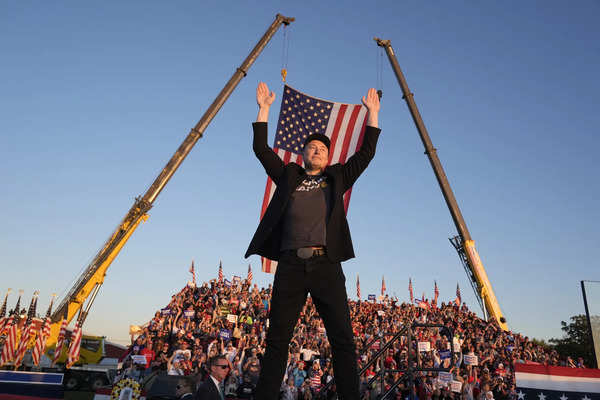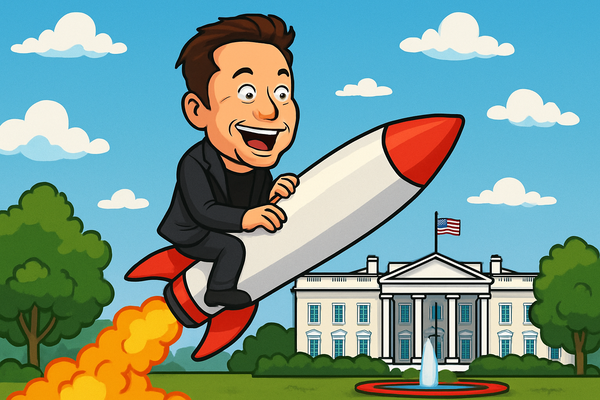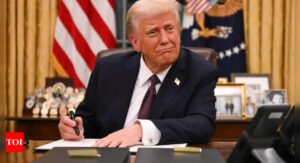DOGE DAY OVER: Why Elon Musk is quietly retreating from politics | World News

For a man who once promised to colonise Mars, Elon Musk couldn’t even survive six months in the swamp. Washington, D.C.—that festering geyser of bureaucracy, ego, and eternal meetings about meetings—has finally proved too much for the self-anointed saviour of Earth, Twitter, and now, apparently, the IRS. Elon Musk is stepping back from politics. And not because he succeeded. Because, like every great disruptor who walked into government believing he could “fix” it, he realised too late: the only thing less efficient than the DMV is the federal government with a meme lord at the helm.
DOGE Days Are Over
Musk’s political journey began not with policy, but with vibes. He didn’t want a cabinet seat. He wanted something cooler. So Trump gave him DOGE—the Department of Government Efficiency. Yes, it’s real. Yes, it’s a backronym. And yes, it sounds like it was brainstormed on Reddit.
The idea was simple. Cut $1 trillion in waste, fraud, and abuse. Streamline government like a Tesla production line. Or at least like a SpaceX launch: one explosive failure away from history.
What followed was exactly what happens when you let Silicon Valley run the state. DOGE staffers, mostly plucked from Musk’s personal companies, showed up to federal agencies with all the charm of a ransomware attack. Agencies were gutted. Grants vanished. Entire departments were told they were “non-essential” by a racist teenager in a hoodie carrying a MacBook Air and a bad attitude.
Within months, DOGE had tried to axe USAID, slash NIH research, cancel veterans’ programmes, and moonwalk through IRS data systems like it was a Tesla server farm. And all under the watchful eye of a man who once smoked weed on Joe Rogan’s podcast and then lectured senators about wasteful spending.
From Chainsaw Messiah to Political Scapegoat

Elon Musk’s involvement with DOGE has been associated with public backlash, including acts of vandalism at Tesla sites and a drop in the company’s stock price.
Musk didn’t just stroll into Washington—he revved up a chainsaw onstage at a Trump rally to show how serious he was about “cutting bureaucracy.” In any normal democracy, this would be performance art. In Trump’s America, it earned him a seat at the table.
For a while, he was untouchable. Trump called him a genius. Democrats called him an unelected co-president. Cabinet secretaries called him something unprintable.
But slowly, the wheels came off the Dogecar.
Musk’s plan to “delete” agencies ran headfirst into the people who actually rely on those agencies. Veterans lost therapists. Cancer researchers lost funding. FEMA lost its CFO. At one point, DOGE accidentally listed living immigrants as deceased just to block their financial aid. Yes, really. Bureaucratic genocide, brought to you by someone who thinks satire is a lifestyle.
By spring, even Trump had had enough. He reminded his own team that cabinet secretaries—not Elon Musk—ran the departments. The message was subtle, but clear: “Thanks for the meme engagement, but maybe cool it with the purge.”
Tesla Tanks, Investors Panic
Meanwhile, back in the land of profit margins and shareholder calls, Tesla was tanking. Sales plummeted. Profits evaporated. Musk was too busy playing Budget Batman to notice his factories falling apart. At one point, German sales collapsed so hard it looked like Berlin had declared war on Autopilot.
The numbers were catastrophic: Tesla’s quarterly earnings dropped by over 70%, its share price shed nearly 40% in a matter of weeks, and investors began staging verbal interventions on live TV. “Focus on cars, not Washington,” became the polite version. The impolite version was a lot louder—and involved angry letters, shareholder lawsuits, and one memorable protest at a Tesla showroom where someone dressed as Uncle Sam chained himself to a Cybertruck.
Even Tesla insiders were spooked. Rumours swirled of delayed product launches, quality-control issues, and supply chain chaos worsened by Musk’s chronic absenteeism. One executive, speaking off the record, reportedly said, “We’re not building rockets here. We just want the cars to have doors that shut properly.”
Investors, who had tolerated Musk’s extracurricular chaos through Dogecoin and flamethrowers, finally snapped. The market tanked. Musk promised he’d “focus more on the business.” The stock bounced. Wall Street cheered like it was the Fourth of July.
Even Musk’s earnings call was a masterclass in surrender: “I’ll be scaling back my work with the federal government. One or two days a week tops.” Translation: “Please stop shorting my stock.
From Heat Shield to Scorched Earth

Trump, ever the pragmatist, didn’t dump Musk. He repurposed him. The man who once lit up the stage with chainsaws is now a glorified “special government employee,” capped at 130 working days a year. That’s about as much influence as a White House intern, except with more X followers and fewer subpoenas.
Behind closed doors, Trump reportedly called Musk a “tremendous help” but admitted it might be “time for him to focus on his companies.” Translation: “This guy’s more trouble than he’s worth, but I still want his money.”
And let’s not forget: Musk dumped hundreds of millions into the 2024 Trump campaign and pledged another $100 million for the GOP. Which means, for all his policy failures, he’s still the Republican Party’s most valuable ATM.
Exit Stage Meme

Musk’s tenure as America’s Budget Czar was many things: brief, chaotic, wildly overhyped, and eerily illustrative of what happens when power meets hubris in the nation’s capital. He claimed he could slash a trillion dollars. He managed $150 billion—and even that figure may include counting George W. Bush-era programme cuts and imaginary savings from grants that didn’t exist.
Now, with lawsuits looming, court orders flying, and protesters chaining themselves to Tesla Superchargers, the Rocket Man has crash-landed. DOGE is still around, technically. Its website still lists “efficiency initiatives.” But the revolution has lost its meme king.
Musk May Be Out, But the Mess Remains

Musk’s political fadeout isn’t an ending—it’s a pause. The technocrat firebrand may be retreating to Tesla HQ, but his fingerprints are all over the agencies he “streamlined.” And his allies? Still scattered across Washington like bad code in a beta release.
If there’s a lesson here, it’s this: Government isn’t a start-up. You can’t A/B test food stamps. You can’t crowdsource climate policy. And when you treat public service like a pet project, the pets bite back.
Musk thought he could save America. America just asked for a refund.






